By Naiké Ledan, Patricia Kearns and Jennifer Beeman
In February, Breast Cancer Action Quebec (BCA-Qc) wrapped up its important 3I project that was funded by Status of Women Canada to address barriers that girls and young women from diverse communities confront when aspiring to participate in civic, political, and community life; 3I also worked to empower them, especially regarding their leadership on health issues.
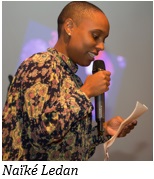
The results have spread far beyond the initial scope of the grant, transforming BCA-Qc’s youth program in the process. Naïké Ledan, our youth coordinator, brought her skills as a gifted youth animator working within an anti-oppression and social justice framework to oversee and update our popular education youth workshops.
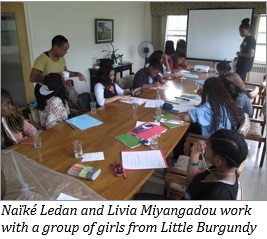
One of the first tasks Naïké undertook in 2013 was to establish strong working partnerships with relevant community organizations that worked with youth. She engaged leaders within Montreal communities—from Rivière-des-Prairies to Côte-des-Neiges—to identify the resources in their communities that help girls find their place as actors within civic and community life, as well as the existing gaps. Once her needs assessment was completed and the barriers were identified, Naïké was ready to go. She looked for and found young women who worked with her to develop strategies that could address the challenges within their communities, especially regarding the health and self-esteem of young women.


During this time, BCA-Qc’s office became home to many new faces. It took some time to create trust, but Naïké was patient and soon introduced the young women to exercises that had them thinking in new ways about their life experiences. A combination of play and serious reflection, these exercises delved into the deep territory of cultural and sexual stereotyping as well as complex and hard-lived experiences. Once the girls had opened up and began sharing their experiences, Naïké took a back seat and practiced what she refers to as “active listening.” With an eye toward having these girls become youth leaders in their respective communities, Naïké encouraged them to imagine the kind of girl-led actions that could have a real impact where they live. What did they think would work? What was important to them and other girls in their communities?
Over the course of the project, six distinct groups of 3I participants evolved; Naïké worked to help the young women come together to develop their own analyses of their experiences and create collective artistic expressions of their visions.
By the summer of 2014, five groups had completed their girl-led actions, with great success. (One more group would meet after the Forum.) Over the summer, Naïké wondered how best to share the outcomes of the 3I project with the girls, community partners, funders and other interested stakeholders. She envisioned a day-long event where girls would showcase what they had accomplished. She wanted the day to be a celebration of their work and commitment to 3I. She also wanted to offer them a gift of inspiration, something significant they would not soon forget.
The 3I Forum at the McCord Museum, October 10, 2014:
Naïké knew she was right on track when the three special guests she had in mind accepted her invitation to participate: Cathy Wong, president of the Conseil des Montréalaises; Sarah St-Fleur, a media diversity activist blogger better known as Queen Sized Flava; and d’bi young, dub poet and performance artist.  Naïké also found the right emcee for the Forum in Shawna Ketter, a long-time BCA-Qc volunteer.
Naïké also found the right emcee for the Forum in Shawna Ketter, a long-time BCA-Qc volunteer. 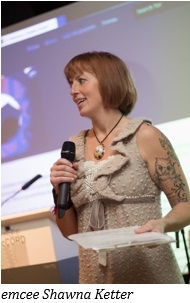 These guests opened the Forum—each gave a powerful talk based on her own experience of becoming a leader in her community and the obstacles facing girls, especially those from marginalized communities.
These guests opened the Forum—each gave a powerful talk based on her own experience of becoming a leader in her community and the obstacles facing girls, especially those from marginalized communities.
Cathy Wong spoke about building her own identity and coming to fully accept the importance of occupying positions of power that can promote change in the community. With a Chinese-Vietnamese background and as a second-generation immigrant, she had to develop skills very early in her life that would allow her to navigate different codes and become the link between cultures and communities. Her reality was the source of her training; in the process of building her skills, she naturally emerged as an eminent leader. She urged young women—particularly those having an immigrant experience—to take their places, to use their voices, and to help shape their communities into better, more inclusive and vibrant shared places.
Sarah St-Fleur, aka Queen Sized Flava, followed Cathy Wong’s lead and also shared her personal experience as a second-generation immigrant child who had to navigate different cultural codes—that varied drastically from the home to the street—in order to develop the skills necessary to negotiate these differences. Finding self-love, self-awareness, and confidence in the process became fundamental for her as a young, fat (her word, which she uses affirmatively), black woman. Her creativity, and her smart and beautiful sense of humour, allowed her to understand the political aspects of exclusion very early in life. She appropriated the word “fat” and coupled it with “beautiful.” She is now a motivational speaker supporting body diversity, a plus-sized model, and a stand-up comedian.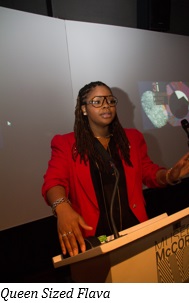
The amazing d’bi young concluded the morning with a creative play, sharing stories of young women confronting oppressive barriers, addressing them, and finding redemption. In a very moving piece, a range of characters came to life and reinvented their destiny in their own terms. d’bi told these stories to offer the gift of spiritual redemption to women and girls.
After the first half of the event, young women leaders from the five girl-led initiatives were invited to take the stage and to share the knowledge and good practices that originated from their experiences.
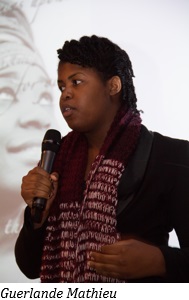 First up was Guerlande Mathieu, a sports physiotherapy student at Cégep Marie-Victorin. Her group was made up of students at Jean-Grou High School in Rivière-des-Prairies, a big school whose population is 90% Haitian. At ease with the mic, Guerlande described how their activity, Couleur Café/My Black is Beautiful, involved a series of events dedicated to leadership, critical thinking, and Black History Month. The week of February 17-21 kicked off with a photographic exhibition and opening ceremonies. The photos were large-format black and white portraits; each had an inspirational quotation that was chosen by its subject and incorporated into the work.
First up was Guerlande Mathieu, a sports physiotherapy student at Cégep Marie-Victorin. Her group was made up of students at Jean-Grou High School in Rivière-des-Prairies, a big school whose population is 90% Haitian. At ease with the mic, Guerlande described how their activity, Couleur Café/My Black is Beautiful, involved a series of events dedicated to leadership, critical thinking, and Black History Month. The week of February 17-21 kicked off with a photographic exhibition and opening ceremonies. The photos were large-format black and white portraits; each had an inspirational quotation that was chosen by its subject and incorporated into the work.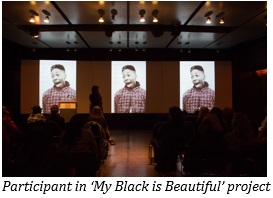 The week’s activities encouraged reflection on self-esteem, personal growth, solidarity and civic action. Guerlande’s personal example that she shared with her girls was spot on: She recounted cutting her hair; “I rebelled against what I was supposed to be.” Like most young black girls, she grew up having her hair permed regularly to keep it from becoming an afro. “I cut my hair—j’ai adoré ça! It was great to show young girls that rebellion is good.” Then, she showed us the short joyful film, Couleur Café/My Black is Beautiful, a collage of sound and image that follows their process, expertly put together by filmmaker Youri-Jude Cantave.
The week’s activities encouraged reflection on self-esteem, personal growth, solidarity and civic action. Guerlande’s personal example that she shared with her girls was spot on: She recounted cutting her hair; “I rebelled against what I was supposed to be.” Like most young black girls, she grew up having her hair permed regularly to keep it from becoming an afro. “I cut my hair—j’ai adoré ça! It was great to show young girls that rebellion is good.” Then, she showed us the short joyful film, Couleur Café/My Black is Beautiful, a collage of sound and image that follows their process, expertly put together by filmmaker Youri-Jude Cantave.
Next, Spencer Gallagher reported on her group, from the community organization LOVE (Leave Out Violence). For their project, they chose to make an experimentaldocumentary film focusing on self acceptance as the key to empowerment. They called it FIND YOUR OWN TITLE; the three stories tell of girls confronting feelings of worthlessness and finding the courage to step out of their comfort zones. The film includes dramatization, performance, and image deconstruction. A big accomplishment, this inventive film took hard work on many levels. Spencer remembered moments of doubt and anxiety. She told the audience, “I looked at my girlfriends and they said to me, ‘Yes, you can do it.’ Now it is done, and it’s good and we all walked away feeling closer.”
There was great applause for FIND YOUR OWN TITLE, a film that uses humour, animation techniques, and honesty to express the transformation from feeling undeserving and blocked to becoming empowered and creative.
The third project was presented by Alina Grenier-Arellano, a third-year McGill student in International Development.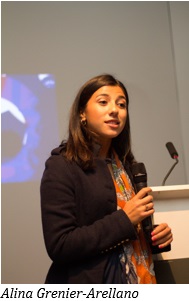 Her group was made up of a number of young women volunteers who recently had either worked with, or expressed interest in working with, BCA-Qc’s youth program. They decided to hone their leadership skills to create an event for young women, aged 14-18, on the theme: The Effects of Cultural Expectations & Behavioural Norms on Women’s Leadership. The group met on a weekly basis and by consensus decided the who, what, where and when of the event. Making sure they did sufficient outreach to attract young girls to their leadership event was crucial. They came up with a name for themselves: OWL (Optimizing Women’s Leadership), and Marielle Rosenbluthdesigned a visually arresting logo that they used in their communications strategies.
Her group was made up of a number of young women volunteers who recently had either worked with, or expressed interest in working with, BCA-Qc’s youth program. They decided to hone their leadership skills to create an event for young women, aged 14-18, on the theme: The Effects of Cultural Expectations & Behavioural Norms on Women’s Leadership. The group met on a weekly basis and by consensus decided the who, what, where and when of the event. Making sure they did sufficient outreach to attract young girls to their leadership event was crucial. They came up with a name for themselves: OWL (Optimizing Women’s Leadership), and Marielle Rosenbluthdesigned a visually arresting logo that they used in their communications strategies.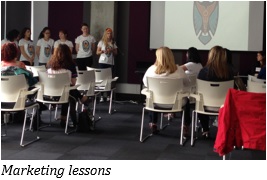 Three speakers were chosen to represent a diversity of professions across business, academia and the arts. But whether through statistics, studies or stories, each shed light on the fact that inequality still exists in the workplace. By using a series of interactive exercises following the talks, the organizers encouraged the audience to work in small groups, sharing suggestions and strategies to overcome the barriers that cultural expectations can lead to in the workplace. The speed dating format kept the afternoon lively and participants on their toes!
Three speakers were chosen to represent a diversity of professions across business, academia and the arts. But whether through statistics, studies or stories, each shed light on the fact that inequality still exists in the workplace. By using a series of interactive exercises following the talks, the organizers encouraged the audience to work in small groups, sharing suggestions and strategies to overcome the barriers that cultural expectations can lead to in the workplace. The speed dating format kept the afternoon lively and participants on their toes!
Cynthia Ankemah, a recent immigrant from Côte d’Ivoire, reported on the fourth project, where a group of young women from the Cote-des-Neiges Community Centre worked with the Digital Literacy Program at the Atwater Library. They created a zine that focuses on Self-Love. Cynthia felt absolutely fortunate to be able to take part as a young leader for the girls; she appreciates the tremendous resources we have available to us in Quebec.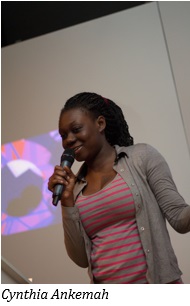 In Côte d’Ivoire, she was unable to learn about technology and art due to the lack of such studies in schools or elsewhere. Having an enthusiastic role model like Cynthia was perfect for this group of girls, whose own socio-economic burden can undermine creativity. Cynthia said, “We started the project like a game, but soon everyone was really interested in what we could do with Photoshop, Paint and other programs. Now I work with 3D. We met every Saturday with Naïké, worked on our projects and ate new foods.” They put their zines together to create a short film, which you can watch here along with the other groups’ work, and it’s where you can also see 3I project photos.
In Côte d’Ivoire, she was unable to learn about technology and art due to the lack of such studies in schools or elsewhere. Having an enthusiastic role model like Cynthia was perfect for this group of girls, whose own socio-economic burden can undermine creativity. Cynthia said, “We started the project like a game, but soon everyone was really interested in what we could do with Photoshop, Paint and other programs. Now I work with 3D. We met every Saturday with Naïké, worked on our projects and ate new foods.” They put their zines together to create a short film, which you can watch here along with the other groups’ work, and it’s where you can also see 3I project photos.

 The last project was named Makenin: The Making of New Leaders. This involved four young leaders who planned a weekend retreat on Île Saint-Bernard to give a series of empowerment workshops to a group of young girls. Livia Miyangadou told us about the weekend and about being a leader whose slant on empowerment has everything to do with the choices we make in our lives. Our decisions can lead to better moods and better health, or not. “People look for two things: to love and be loved. With knowledge comes choice, and choice is a step toward freedom. To prevent making unhealthy choices, we need to dig deep.” Having only two days with the girls meant that the workshops were intense and full. The group made a collective art piece—a black mannequin was transformed to tell the story of body pain, body love, respect and redemption; she lives in BCA-Qc’s office. Please come by to feel the power that is inscribed on this black body.
The last project was named Makenin: The Making of New Leaders. This involved four young leaders who planned a weekend retreat on Île Saint-Bernard to give a series of empowerment workshops to a group of young girls. Livia Miyangadou told us about the weekend and about being a leader whose slant on empowerment has everything to do with the choices we make in our lives. Our decisions can lead to better moods and better health, or not. “People look for two things: to love and be loved. With knowledge comes choice, and choice is a step toward freedom. To prevent making unhealthy choices, we need to dig deep.” Having only two days with the girls meant that the workshops were intense and full. The group made a collective art piece—a black mannequin was transformed to tell the story of body pain, body love, respect and redemption; she lives in BCA-Qc’s office. Please come by to feel the power that is inscribed on this black body.

